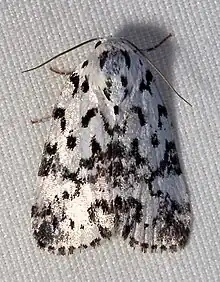| Polygrammate | |
|---|---|
 | |
 | |
| Scientific classification | |
| Domain: | Eukaryota |
| Kingdom: | Animalia |
| Phylum: | Arthropoda |
| Class: | Insecta |
| Order: | Lepidoptera |
| Superfamily: | Noctuoidea |
| Family: | Noctuidae |
| Genus: | Polygrammate Hübner, 1818 |
| Species: | P. hebraeicum |
| Binomial name | |
| Polygrammate hebraeicum Hübner, 1818 | |
| Synonyms | |
|
Generic
Specific
| |
Polygrammate is a monotypic moth genus of the family Noctuidae.[1][2][3] Its only species, Polygrammate hebraeicum, the Hebrew moth or Hebrew, is found in the eastern parts of North America, from Ontario, south to Florida and as far west as Texas. Both the genus and the species were first described by Jacob Hübner in 1818.

Polygrammate hebraeicum larvae
The wingspan is 23–39 mm. Adults are on wing from May to August.
The larvae feed on black gum trees.
References
- ↑ Savela, Markku (July 11, 2019). "Polygrammate Hübner, 1818". Lepidoptera and Some Other Life Forms. Retrieved May 23, 2020.
- ↑ Beccaloni, G.; Scoble, M.; Kitching, I.; Simonsen, T.; Robinson, G.; Pitkin, B.; Hine, A.; Lyal, C., eds. (2003). "Polygrammate". The Global Lepidoptera Names Index. Natural History Museum. Retrieved May 23, 2020.
- ↑ Pitkin, Brian & Jenkins, Paul (November 5, 2004). "Polygrammate Hübner, 1818". Butterflies and Moths of the World. Natural History Museum, London. Retrieved May 23, 2020.
External links
Wikimedia Commons has media related to Polygrammate hebraeicum.
- "931497.00 – 9285 – Polygrammate hebraeicum – Hebrew Moth – Hübner, 1818". North American Moth Photographers Group. Mississippi State University. Retrieved May 23, 2020.
- "Polygrammate hebraeicum Hebrew Moth". NatureServe Explorer. Retrieved May 23, 2020.
This article is issued from Wikipedia. The text is licensed under Creative Commons - Attribution - Sharealike. Additional terms may apply for the media files.